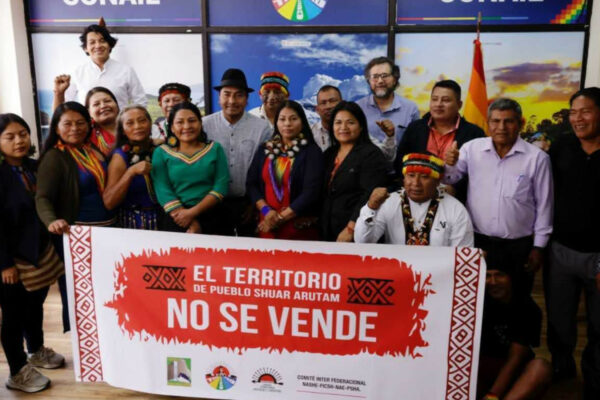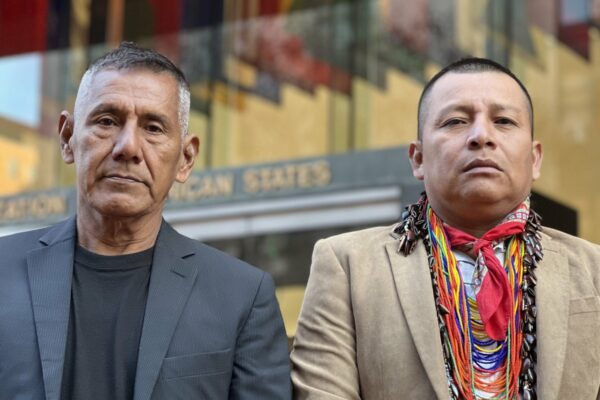Bolivian indigenous leaders vow to keep fighting a road project through a national park on their ancestral homeland even though President Evo Morales said he would suspend construction pending a national dialogue.
On Sunday, 500 police tear-gassed and rousted about half of 1,500 indigenous protesters making a 300-mile march to the capital, La Paz. The marchers say four people were killed, scores of protesters were injured and several others were still missing Tuesday. Bolivian officials emphatically denied Monday any deaths or injuries but promised to launch a full-scale investigation into the raid, which they said was undertaken to save lives and avoid confrontations.
Indigenous leaders, who maintain the marchers were unarmed, expressed their skepticism Tuesday over Morales’ statement.
“We don’t believe what he says anymore,” said Rosario Barradas, a leader of the Conference of Indigenous People.
“We are reorganizing to continue this,” Barradas told CNN. “We are not going to stop until this is solved.”
Solving it may take some doing, analysts say.
Monday night’s concession to suspend construction “will lower pressure but won’t solve the problem,” said Jaime Aparicio, the Bolivian ambassador to the United States from 2002 to 2006. “This is not an easy problem to solve.”
At the heart of the dispute lies the construction of a highway through the Isiboro-Secure Indigenous Territory and National Park, a rainforest preserve commonly known by its Spanish acronym of TIPNIS. The road, being constructed mostly by a Brazilian company, aims to give Brazil access to Pacific Ocean ports by connecting to highways in Chile and Peru.
Brazil’s National Bank for Economic and Social Development is financing $330 million of the road’s estimated $415 million cost, the Bolivian government has said.
“There’s a lot of money involved,” said journalist Martin Arostegui, who has lived in Bolivia for the past five years.
That money has an even bigger impact on Bolivia, one of the poorest and least developed nations in Latin America. About one of every three Bolivians lives below the poverty level.
“The rights of indigenous people are recognized on paper, but, unfortunately, when it comes to these big economic projects that come from the top down, these rights get swept by the wayside,” said Andrew Miller, a spokesman for the Amazon Watch advocacy group.
Many critics say the road would open up the TIPNIS even more to coca growers and lead to further deforestation and destruction of the indigenous way of life.
A report released this month by the United Nations Office on Drugs and Crime points out that significant cultivation of coca – the source of cocaine – in Bolivia’s two national parks already exists. Of about 31,000 hectares of coca cultivated nationwide in 2010, the U.N. said, more than 2,200 hectares were in the national parks – an increase of 8% over 2009. Cultivation in the TIPNIS increased by 9% over the previous year, the U.N. report said. Cultivation in the national park in Carrasco province increased by 8%.
A 2005 U.N. report cited the “irreversible damage” already done by coca cultivation in Bolivia’s national parks.
The fact that the road would further make the TIPNIS available to coca cultivators has been known even outside Bolivia for many years, said Ronald MacLean-Abaroa, a 2002 presidential candidate and four-time mayor of La Paz from 1985 to 1997. MacLean-Abaroa, who also served as Bolivian foreign minister in 1992 and 1993, noted that a Brazilian presidential candidate referred to it as “the cocaine road” nearly a decade ago.
There also are social concerns for a large indigenous population that is used to living in relative isolation, said Miller, the Amazon Watch spokesman.
Of the nation’s 10 million residents, about 30% are Quechua, another 30% are of mixed white and Amerindian ancestry, 25% are Aymara and 15% are white, according to the CIA World Factbook.
Spanish is spoken by more than 60% of Bolivians, Quechua is spoken by 21% and Aymara by nearly 15%, the Factbook says. All three are official languages.
The coca farmers and other newcomers brought in by the new road are often referred to as colonialists by the indigenous and others. And those outsiders bring a new way of life.
“There’s a series of predictable outcomes,” Miller said. “There’s social disintegration – cultures, languages, family structures, traditional authorities, the decision-making process.
“There’s a money economy that comes in,” Miller said. “Men looking for jobs leave the community. That has an impact. There’s money spent on alcohol, prostitutes. The men come back to the community and bring back sexually transmitted diseases and other diseases.
“There’s an increase in social conflict. More colonialists and outsiders who come in, that can increase tensions.”
The indigenous movement has been on the upswing since 1990, when a large march to La Paz helped to solidify their power.
That burgeoning power seemed to come to fruition in December 2005, when Morales was elected the nation’s first indigenous president. Running on a platform of empowering the nation’s indigenous majority, Morales won by the widest margin of any candidate since the restoration of civilian rule in 1982.
He easily won re-election in December 2009, when his party also gained control of the nation’s legislature.
Now many of those indigenous supporters feel Morales has deserted them.
“Evo Morales’ government does not respect human rights,” said indigenous leader Barradas. “Of course, we are betrayed because the indigenous people supported him to establish a plurinational government.”
Barradas and some other observers say Morales really has a stronger allegiance to cocaine producers than to the indigenous. Morales started his political career in the 1980s as a union leader for coca growers.
“He backs the cocaine sector,” Barradas said. “He has no respect for indigenous territories, for Mother Nature.”
Aparicio, the former Bolivian ambassador, says Morales’ political base is the “cocaleros,” a term for the cocaine producers.
Coca, long a traditional crop in Bolivia, has achieved a large measure of legitimacy under Morales. The 2009 constitution allows legal regulation of coca cultivation, and the crop is part of the nation’s cultural heritage, a natural resource and a factor of social cohesion.
Bolivia is the world’s third-largest cultivator of coca, behind Colombia and Peru, the CIA Factbook says.
Analysts point out that many of the “cocaleros” back the proposed road between the Bolivian cities of Villa Tunari and San Ignacio de Moxos.
The Bolivian government extolled the supposed benefits area residents would receive from the road, saying it would help the indigenous receive better health care and education. Indigenous from at least 16 communities expressed their support for it.
But many indigenous remained steadfastly opposed and were marching to La Paz when police swooped in Sunday afternoon near the town of Yucumo and carted many of them off in buses. Authorities aimed to disperse the protesters by putting them on planes and flying them home.
The marchers were resting, cooking dinner, washing clothes and bathing when police arrived, Barradas said.
“We were surprised, ambushed, assaulted and abducted by the police,” she said Monday afternoon, about 24 hours after the raid.
Police efforts were thwarted, though, when local indigenous people shut down two airports and freed many of those who had been apprehended by police. All the protesters apparently had gained their freedom by Tuesday.
The Bolivian government initially said the police intervention had been done to protect the marchers.
“The only reason for the action that was taken was to avoid a confrontation between civilians,” Interior Minister Sacha Llorenti said Monday morning.
Problems started to build for Morales, though, a short while later when Defense Minister Cecilia Chacon resigned in protest over the police intervention.
By Monday afternoon, the government had ordered an investigation into whether “excessive force” had been used.
Late Monday night, Morales said he would suspend construction during this “national debate,” saying the public would decide the road’s fate.
Barradas remained suspicious.
“He didn’t say it would be indefinitely (suspended),” she said.
On Tuesday morning, a vice minister for interior matters, Marcos Farfan, resigned. Morales’ chief of staff, Carlos Romero, said Farfan had ordered the police intervention. Government officials had been maintaining since Monday that the order had not come from Morales.
On Tuesday night, Interior Minister Llorenti also resigned.
Government officials also spent much of Tuesday repeating that a full and impartial investigation would be held and those who were responsible would be punished “no matter who they are.” Bolivia even asked the United Nations to investigate.
Morales traveled Tuesday to a village about 200 miles north of La Paz to offer his apology.
“It’s lamentable that these problems presented themselves and that there were excesses committed by some police officials, who will be sanctioned accordingly,” Morales said.
“The government is very scared,” said MacLean-Abaroa, the former presidential candidate. “They are distancing themselves from their decision.”
Morales risks losing support from the indigenous people, analysts say.
“The events of the past few days are as serious as they have been in a very long time,” said journalist Arostegui. “There’s been a revolt by his own power base.”
Former ambassador Aparicio also sees a threat from Morales’ core constituency.
“This has uncovered an enormous contradiction in the social base for the president’s politics,” Aparicio said. “The problem came from precisely those he supposedly was going to defend.”
Morales has already paid a large political price, MacLean-Abaroa said.
“This will leave a profound impact,” he said. “The government’s reputation has changed. Its reputation and legitimacy are on the floor.”
And despite Morales’ actions to suspend construction and order a full investigation, it may be too little, too late.
“He allowed it to proceed to a point of no return that does not have an easy solution,” Aparicio said.
Many critics point out that Morales, a vocal defender of the environment who often refers to Mother Earth, threatens to harm the Amazon rain forest with his support of the highway.
“This road will damage this territory of the indigenous people,” Barradas said. “That would be homicide. This is where we live. We live off this jungle, off nature.”













